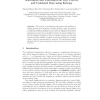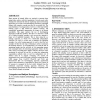109
click to vote
TASLP
2010
14 years 8 months ago
2010
To solve the knowledge bottleneck problem, active learning has been widely used for its ability to automatically select the most informative unlabeled examples for human annotation...
NIPS
2000
15 years 3 months ago
2000
Modern classification applications necessitate supplementing the few available labeled examples with unlabeled examples to improve classification performance. We present a new tra...
130
click to vote
IJCAI
2003
15 years 3 months ago
2003
We present a description of three different algorithms that use background knowledge to improve text classifiers. One uses the background knowledge as an index into the set of tra...
NIPS
2001
15 years 3 months ago
2001
We investigate the following data mining problem from Computational Chemistry: From a large data set of compounds, find those that bind to a target molecule in as few iterations o...
116
click to vote
NIPS
2001
15 years 3 months ago
2001
To classify a large number of unlabeled examples we combine a limited number of labeled examples with a Markov random walk representation over the unlabeled examples. The random w...
127
click to vote
CIVR
2006
Springer
15 years 5 months ago
2006
Springer
Abstract. Interactively learning from a small sample of unlabeled examples is an enormously challenging task. Relevance feedback and more recently active learning are two standard ...
120
click to vote
WAIM
2010
Springer
15 years 7 months ago
2010
Springer
Abstract. The problem of classification from positive and unlabeled examples attracts much attention currently. However, when the number of unlabeled negative examples is very sma...
114
click to vote
MIR
2003
ACM
15 years 7 months ago
2003
ACM
Huge amount of manual efforts are required to annotate large image/video archives with text annotations. Several recent works attempted to automate this task by employing supervis...
104
click to vote
PAKDD
2005
ACM
15 years 7 months ago
2005
ACM
Self-training is a semi-supervised learning algorithm in which a learner keeps on labeling unlabeled examples and retraining itself on an enlarged labeled training set. Since the s...
105
click to vote
ECML
2005
Springer
15 years 7 months ago
2005
Springer
Abstract. We study the problem of learning from positive and unlabeled examples. Although several techniques exist for dealing with this problem, they all assume that positive exam...


